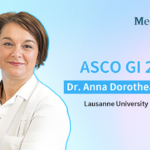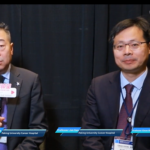
The rapid advancements in modern oncology have introduced numerous breakthrough treatment options for lung cancer, making it one of the fastest-evolving solid tumors. To help clinicians gain an in-depth and comprehensive understanding of major developments in this field, Oncology Frontier has collaborated with Dr. Hua Zhong and Dr. Baohui Han from the Department of Respiratory and Critical Care Medicine at Shanghai Chest Hospital to launch a clinical progress series—"Zhong" Sound "Hui" Words. Through in-depth analyses of high-quality clinical studies in lung cancer, this series aims to enhance clinical decision-making and treatment practices.In the 25th edition, Professors Zhong and Han provide an expert analysis of the study “Phase 2 Open-Label Study of Sacituzumab Govitecan as Second-Line Therapy in Patients With Extensive-Stage SCLC: Results From TROPiCS-03” recently published in the Journal of Thoracic Oncology.
Dr. Baohui Han: Small cell lung cancer (SCLC) is a highly aggressive subtype of lung cancer, with most cases linked to smoking. At the time of diagnosis, approximately two-thirds of SCLC patients already have extensive-stage disease. For these patients, the current standard-of-care and most recent treatment approach consists of platinum-based chemotherapy combined with immune checkpoint inhibitors. However, the two-year survival rate remains low, at only 14%–22%. Once disease progression occurs, treatment options become extremely limited, particularly for patients with platinum-resistant disease, who face a significantly worse prognosis.
In the second-line setting, topotecan is the currently recommended standard treatment. However, its clinical efficacy is quite limited, and it is associated with significant hematologic toxicity and gastrointestinal side effects such as diarrhea, which restrict its widespread clinical use. Recently, Tarlatamab, a bispecific T-cell engager, received accelerated approval based on a single-arm Phase II trial. However, this drug is still in the developmental phase in China, with ongoing clinical trials and no immediate availability.
Sacituzumab govitecan is an antibody-drug conjugate (ADC) targeting Trop-2, with a drug-to-antibody ratio (DAR) of 7.6. The results of this multi-cohort study suggest that ADC therapy may offer a new potential treatment option for patients with ES-SCLC. Approximately 40% of patients achieved an objective response with sacituzumab govitecan. However, it is important to note that in SCLC, ORR does not necessarily correlate with PFS, which remained relatively short at just 4.4 months. Further strategies are needed to enhance durability of response.
Additionally, the incidence of grade 3 or higher adverse events exceeded 70%, which may limit the further clinical application of sacituzumab govitecan or its potential role in combination therapy strategies. From a translational research perspective, it remains unclear whether Trop-2 expression levels on tumor cells correlate with clinical benefit.
Overall, there remains a significant unmet need in the second-line treatment of ES-SCLC. Currently, no highly effective, low-toxicity treatment options are available. Continued global research efforts are crucial to developing novel therapies that can provide better treatment options for patients with ES-SCLC.
Dr. Hua Zhong: Emerging Second-Line Treatment Options for Small Cell Lung Cancer
Currently, several potential second-line treatment options for small cell lung cancer (SCLC) are emerging, particularly bispecific T-cell engagers and antibody-drug conjugates (ADCs). Among ADCs, different therapeutic targets such as B7H3 and Trop-2 are being explored.
Previously, the Journal of Clinical Oncology (JCO) published long-term efficacy data on Tarlatamab as a later-line treatment for SCLC. The study included 152 patients, with 17 receiving 10 mg every two weeks, 8 receiving 30 mg every two weeks, and 76 receiving 100 mg every two weeks. The results showed an overall response rate (ORR) of 25%, with a median progression-free survival (PFS) of 3.5 months and a median overall survival (OS) of 17.5 months. The median duration of response (DOR) was 11.2 months, with 34.2% of patients maintaining a response for over 12 months. Among the 17 patients who received the recommended Phase II dose, ORR, DOR, and median OS were 35.3%, 14.9 months, and 20.3 months, respectively.
A subsequent single-arm Phase II clinical study enrolled 100 patients. According to long-term follow-up data, the 10 mg dose group achieved an ORR of 40% and a disease control rate (DCR) of 70%, with 26% of patients maintaining a response for over 52 weeks. The 12-month PFS rate was 24.0%, the median PFS was 4.3 months, and the median OS was 15.2 months, with an 18-month OS rate of 46.0%. The treatment demonstrated good long-term tolerability.
I-Dxd, an ADC targeting B7H3, was presented at this year’s World Conference on Lung Cancer (WCLC), showcasing its efficacy and safety as a later-line treatment for extensive-stage SCLC. Patients meeting the inclusion criteria were randomized 1:1 to receive I-Dxd at either 8 mg/kg or 12 mg/kg every three weeks. A total of 46 and 42 patients were enrolled in the two groups, respectively. The ORR for the two groups was 26.1% and 54.8%, with a median DOR of 7.9 months and 4.2 months, median PFS of 4.2 months and 5.5 months, and median OS of 9.4 months and 11.8 months. The incidence of grade 3 or higher adverse events was 43.5% and 50% in each group, respectively.
Additionally, WCLC presented data on SHR-A1921, another ADC targeting Trop-2, for later-line treatment of extensive-stage SCLC. In this study, patients who met the inclusion criteria received SHR-A1921 at a dose of 3 mg/kg. A total of 17 patients were enrolled, with an ORR of 33.3%, a DCR of 66.7%, a median DOR of 4.4 months, and a median PFS of 3.8 months. The incidence of grade 3 or higher adverse events was 35.3%.
The Unmet Need in Second-Line Treatment for Small Cell Lung Cancer
Overall, second-line treatment options for SCLC remain highly limited. At present, there are no targeted therapies specifically approved for SCLC, which significantly restricts improvements in survival outcomes and represents one of the greatest unmet clinical needs in lung cancer treatment.
About Dr. Baohui Han

- Leading Talent of Shanghai
- Honorary Director, Department of Respiratory Medicine, Shanghai Chest Hospital, Shanghai Jiao Tong University School of Medicine
- Outstanding Academic Leader in Shanghai
- Director of the Drug Clinical Trial Institution, Recipient of the State Council Special Allowance
- Member, Chinese Society of Clinical Oncology (CSCO) Lung Cancer Committee
- Executive Committee Member, CSCO Clinical Oncology Collaboration Committee
- Chair, CSCO Tumor Angiogenesis Targeted Therapy Committee
- Director, Ministry of Health Respiratory Endoscopy Training Center
- Standing Member, Chinese Medical Doctor Association Oncology Committee
- Vice President, Chinese Society for Medical Immunology
- Chair, Tumor Immunology Branch, Chinese Society for Medical Immunology
- Vice Chair, Shanghai Medical Association Oncology Molecular Targeting Committee
- Vice President, Shanghai Anti-Cancer Association
About Dr. Hua Zhong

- Director, Department of Respiratory Medicine, Shanghai Chest Hospital, Shanghai Jiao Tong University School of Medicine
- Chief Physician, PhD Supervisor
- Expert Reviewer, National Natural Science Foundation of China
- Board Member, Chinese Society for Medical Immunology
- Member, CSCO Non-Small Cell Lung Cancer Committee
- Board Member, Shanghai Anti-Cancer Association
- Secretary and Member, Shanghai Medical Association Oncology Molecular Targeting Committee
- Member, Chinese Society of Clinical Oncology
- Member, American Society of Clinical Oncology (ASCO)
- Visiting Scholar at the University of Pittsburgh, focusing on basic and translational research in lung cancer immunotherapy
- Principal Investigator for three National Natural Science Foundation projects, four Shanghai Science and Technology Commission projects, one National Key Research and Development Program subproject, and one city-level emerging technology collaboration project
- Recipient of multiple awards, including: Second Prize, Chinese Medical Science and Technology Award Shanghai Anti-Cancer Science and Technology Award Shanghai Jiao Tong University School of Medicine “Research-Oriented Physician Award”


